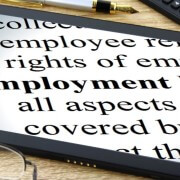Disability Discrimination and Making Reasonable Adjustments in the Workplace
Navigating the complexities of the workplace can be challenging, especially for individuals with disabilities. Understanding the concept of disability discrimination at work and the importance of reasonable adjustments is crucial for both employers and employees.
When living with a disability, being aware of your rights and the responsibilities of your employer can help to ensure fair treatment and equal opportunities in the workplace. Many do not realise that in addition to direct discrimination, indirect discrimination, harassment and victimisation, not making reasonable adjustments in the workplace is a form of discrimination. In this post, we have explored what “reasonable adjustments” means and the legal protection available to disabled employees being treated unfairly at work.
Understanding Disability Discrimination at Work
Disability discrimination occurs when an individual with a physical or mental impairment is treated less favourably than others because of their disability. This can manifest in various ways, such as refusal to employ a disabled person or lack of proper accommodation for an employee’s specific needs. Discrimination can also be subtle, such as not considering an employee for a project or promotion due to assumptions about their capabilities.
Recognising and addressing disability discrimination is not only a legal obligation but also a step towards creating a more inclusive workplace. It is essential for employers to be proactive in identifying and preventing discriminatory practices, and for employees to be aware of their legal rights under the Equality Act 2010 (EqA).
The Legal Framework
In the UK, the EqA provides a clear legal framework to protect individuals from discrimination in the workplace. This Act covers a range of protected characteristics, including disability. It requires employers to make reasonable adjustments for employees with disabilities to ensure they are not at a disadvantage compared to non-disabled employees.
The Act covers a range of disabilities, including physical and mental impairments, and the definition of ‘disability’ under the Equality Act 2010 is relatively wide, yet the impairment must have a substantial and long-term adverse effect on an employee’s ability to carry out normal day-to-day activities. The protection provided applies to all aspects of employment too, from recruitment to training and career development.
What Are Reasonable Adjustments?
Reasonable adjustments are changes made to the work environment or the way things are done to remove or minimise the disadvantage for individuals with disabilities that is created by policies. These adjustments aim to provide equal opportunities for everyone in the workplace. Some common examples include flexible working hours, special equipment or modifying day-to-day duties. The goal is to remove any barriers that hinder an individual’s ability to work as effectively and comfortably as non-disabled employees.
Identifying the Need for Adjustments
The first step in an employer making reasonable adjustments is to identify the needs of the employee with a disability. This often involves a conversation between the employer and the employee to understand the specific challenges and potential solutions. In some cases, professional assessments by occupational health may be necessary. It is also important for employers to create an environment where employees feel comfortable disclosing their disabilities and discussing their needs without fear of stigma or repercussions.
Implementing Adjustments
Once the needs are identified, employers should take appropriate steps to implement the adjustments. The nature of these adjustments will vary depending on the individual’s disability and the specific job role. What is considered “reasonable” in the eyes of the law will also differ depending on factors such as the size of the organisation and the cost of the adjustments.
Employers need to approach this process with an open mind. They should also follow up with the employee to ensure the adjustments are effective and make further modifications if necessary. Employers must remember that a one-size-fits-all approach is often ineffective and they should be as flexible as possible to support employees.
Seeking Professional Advice
Navigating the complexities of disability discrimination and the process of requesting adjustments in the workplace can be daunting for employees. If you find yourself in this situation, seeking advice from legal professionals who specialise in employment law is beneficial. These experts can provide you with information about your rights, your employer’s obligations and the most effective approach to address your needs. They can also assist you in case of any disputes or misunderstandings. If required, they can support you during Employment Tribunal proceedings for disability discrimination compensation.
Overcoming Challenges
As an employee, requesting reasonable adjustments for your disability may present various challenges. You might encounter resistance or a lack of understanding from your employer or colleagues. Financial and logistical considerations might also be raised as concerns by your employer. To overcome these challenges, you should try to be flexible to help you find mutually beneficial solutions and discuss alternative adjustments if your initial request is not feasible. Remember, the goal is to find a balance that allows you to perform your job effectively while respecting your rights and needs.
Speak to an Expert About Disability Discrimination
Disability discrimination at work is an issue that requires action. Employers are legally obliged to make reasonable adjustments to support employees with disabilities, fostering an inclusive work environment. Understanding and implementing adjustments not only supports the day-to-day work life of employees but also contributes to a diverse and productive workforce. Whether you have a physical or mental disability, speaking to your employer and asking for adjustments can significantly impact your ability to carry out your job role to the best of your ability.
If you are experiencing discrimination arising from disability, whether your employer treats you less favourably or they have refused to make reasonable adjustments for you, do not hesitate to contact Damian McCarthy. With more than two decades of experience, Damian has represented clients at the highest levels and has an in-depth understanding of employment law. Damian can discuss the ins and outs of your discrimination claim with you and work with you to achieve results. Take a look at Damian’s website today to find out more about how he can help.






